Robinson Vanoh and his company, Eagle Vetiver Systems Ltd, is the leader in Vetiver System (VS) applications in Papua New Guinea (PNG). Robinson is also a Board member of TVNI with special responsibilities for Small Island Developing States (SIDS) in the South Pacific. In this role he is an active Visiting Agent (VA) to a number of VS programs including some in the Solomon Islands, Fiji and Vanuatu. He administers The Pacific Islands Community Based Vetiver Network (a registered non-profit)
He is very active in his own country (PNG) and the following describes the background to, and some of the VS development. His full review with all the photos is at this link PNG_VANOH
A Green Solution for Sustainable Development in Papua New Guinea and other island nations
Brief Facts about Papua New Guinea (PNG)
PNG is located in the south-west region of the Pacific Basin. It shares a border with Indonesia, through the island of New Guinea. PNG’s total land area is 461,690 square kilometres with a mixture of tropical forests, savannah grass plains, big rivers and deltas, swamps and lagoons and numerous islands and atolls to the east and north-east of the country. PNG has a population of 6.5 million people speaking over 800 languages!
Before self-government in 1973, the Chief Minister, Michael Somare, commissioned the development of what became known as the Eight Aims with the objective to create the equitable distribution of benefits and power. Economic growth was assumed, but not emphasised. The Eight Aims, later the Eight Point Plan, is a statement of intent by the founding fathers of PNG who wanted to build a peaceful, harmonious society, prosperous empowered people. The overall objectives are:
- Increased indigenous participation in the economy;
- Equality amongst ethnic groups, gender, and areas;
- Greater attention to rural and village development; and
- Self-reliance.
Papua New Guinea Vision 2050
PNG Vision 2050 is PNG’s development blueprint covering the period 2010 to 2050. It aims at making PNG an industrializing, middle income country providing high quality life for all its citizens by the year 2050. PNG has great potential, through its human capital and natural resources – land, cash crops, forests and fisheries, to improve its socioeconomic development status.
The Vetiver System (VS)
The Vetiver System is based on the application of Vetiver grass, Chrysopogon zizanioides (formerly – Vetiveria zizanioides). The latter has extraordinary and unique morphological and physiological characteristics, including a deep rooting system with a strong soil-binding capacity and stiff stems. Vetiver grass is both economically and ecologically important. It is one of the few plants that have emerged from obscurity to prominence in a very short time. Since the mid-1980s its application has been widely extended as an important plant for erosion control, land stabilization, water quality improvement, slope stabilization, pollution control, handicrafts, and other applications associated with natural resources management and protection.
Vetiver Grass Technology (VGT) uses the various characteristics of vetiver grass in the form of many different applications; together these applications are collectively named the Vetiver System. Properly applied, we can capitalize on these special unique characteristics to overcome soil erosion, pollution, and other environmental issues. We rely on plants to provide us with food, textiles, building materials and medicines, so there is no reason why we shouldn’t employ them to as a basis for eco-engineering.
Role of the Vetiver System
Vetiver System has been tested and proven, and is currently being used in many countries throughout the world. It impacts positively as an eco-engineering tool, and can achieve fast results in dealing with problems and sustainability issues currently facing PNG. The Vetiver System is appropriate for the sectors involved in rural and community development in PNG, and can be easily incorporated into the PNG Vision 2050. If all the sectors use it, there is then an opportunity for vetiver grass producers, to get involved with VS as a direct income generating enterprise, either by producing planting material, contracting/consulting as landscapers for slope stabilization and other needs, or selling vetiver by-products such as handicrafts, mulch, thatch, forage and other material.
To help the Government of PNG achieve its Vision 2050, Eagle Vetiver Systems Ltd (EVS) is promoting the widespread use of Vetiver Grass in order to encourage Government to invest in green, sustainable, and climate smart solutions such as the Vetiver System. Convincing government policy and decision makers is not easy, therefore EVS is developing a series of demonstration sites relating to various sectors in an effort to convince them of the effectiveness and value of VS
- Tourism — Vetiver handicraft business can be developed to produce products that would appeal to tourists. This would be an important means of income generation and job creation as in Thailand, Indonesia, Philippines, Latin America, amongst others,

Photo1. Roof thatching in Lae, Morobe Province Vetiver grass can be used in construction of hotel cottages using vetiver thatching material and vetiver bricks. Most hotels in the rural settings are faced with the inability to discharge safe wastewater — VS can provide the solution. We have recently started using vetiver leaves for roof thatching of village demonstration huts, and we plan to promote a similar use for tourism resorts in the remote areas that have no access to modern materials.
- Agriculture, livestock and fishing — A major problems in Papua New Guinea and other South Pacific SIDS is soil erosion. In PNG, subsistence agriculture is still the largest single economic activity undertaken. Increasingly subsistence farmers are entering the cash economy through the sales of surplus produce, and by combining subsistence food production with cash cropping. This intensification is leading to increases in soil and fertility loss and is not sustainable under current practices.
VS can help increase crop production through soil and water conservation. Contour aligned Vetiver hedges results in terrace formation. Vetiver mulch is very effective in moisture conservation and weed control. Vetiver grass is also quite effective in pest control e.g. stem borer in maize. Vetiver grass, when correctly managed, is a good livestock forage. VS has many applications for farm infrastructure.
- Agricultural Applications — EVS is promoting, at its own cost, the use of vetiver for soil and water

conservation on small rural farms. Selected farms were planted with hedgerows of vetiver grass by the farmers for comparative visual observation. Very good results were noted with areas planted with vetiver grass
- Education and training — Introduction of the vetiver system into the curriculum at all levels (primary, secondary and tertiary) of education in PNG would help in promoting the vetiver system. This approach was successfully used in East Bali, Indonesia where school children were able to disseminate the vetiver technology successfully. Enabling such introduction requires the support of the Government. We have made an initial approach and are waiting a response from the Government. We have made presentations at the PNG University of Technology and a few community colleges. however at this time the chances of introducing into the education system remains low.
- The Health Sector Waterborne diseases are very high in urban settlements and rural villages

Photo 3. An example from Goroka and Lae showing vetiver planted near and around a latrine. therefore we are introducing Vetiver latrines to help minimise these diseases. We are planting vetiver grass near and around latrines and shower blocks to capture effluent discharge prior to entering waterways.
- Environment, Water and Sanitation —The major challenges relate to deterioration of water quality and quantity; pollution and waste management; impacts of Climate Change and Global Warming; inadequate adoption of bio-technology solutions. VS provides an appropriate technology in dealing with these challenges. EVS will vigorously pursue possibilities.
- Infrastructure Protection Applications – Soil erosion is a major environmental challenge in road works. EVS aims to provide focus to the prevention and control of road way soil erosion, relating to both the road itself and the adjacent land. Often poor design of road drainage will:
- Interfere with the natural drainage. For instance, opening up a culvert often leads to concentration of large quantities of water ,resulting in erosion damages to adjacent land (farm).
- A properly shaped and compacted road surface in itself contributes to an increased run-off both in amount and velocity further exacerbating off site erosion and loss of water
The current road issues nationwide can be characterized as follows:
- Many large gullies are being caused by inadequate road drainage, too much water and high flow velocity over unprotected soils.
- Problems often caused by developments outside the road reserve, i.e., poor farming practices on slopes, deforestation, etc., are resulting in siltation and erosion damages to roads and land downstream (lower catchment).
- Frequent conflicts with the land owners who are refusing to allow drainage of water over their land
- In the context of soil and water conservation activities along roads, the roles and responsibilities of stakeholders such as the Road Authorities, Ministry of Agriculture, land owners and the community are not clearly defined.

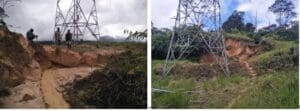
EVS is embarking on and promoting, including carrying out awareness campaigns on the use of vetiver grass for environmental protection services such as infrastructure protection and slope stabilization. We have, and are undertaking major projects with important resources players like PNG LNG project, Ok Tedi Mining, and the main supplier of power in PNG, the PNG Power Ltd. We have been overtime trying to get the support of the Ministry of Works and Highways to accept the VST and use it on the National Roads Nationwide under the “Connect PNG” program to link all the provinces by building new roads.
Few of the major projects successfully undertaken EVS include:
Wastewater Treatment Applications. Two major wastewater (sewer) treatment projects (1) Pacific Adventist University (PAU), 2016 (Port Moresby) and (2) Goroka Town Urban Sewerage Ponds, 2018 (Goroka) were undertaken by EVS in Papua New Guinea. These projects were basically defunct sewerage ponds remediated and planted with vetiver grass around the pond edges for primary treatment. Due to lack of funding by both institutions, secondary treatment applications in the pond on floating Vetiver Islands and wetland were not done, which also includes water sampling. These samplings would have shown the effectiveness of vetiver in treating waste.
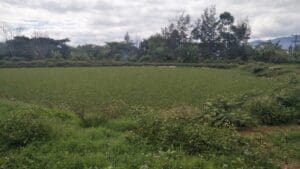
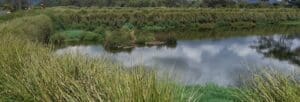
The Goroka municipality’s current sewerage system was designed for a population of 8,000 people in the 1960’s. With recent population growth, both the pond and downstream effluent discharge was posing a hazard to people and the environment, and that its capacity was insufficient. Surface flow of effluent flows consecutively through each of the three ponds, and discharges from pond 4 into the treatment chamber and into the adjacent tributary. Goroka Urban LLG and EVS entered into a contractual agreement to carry out upgrade and rehabilitation works on the current defunct Apoga sewerage ponds. Following works were carried out: site clearing, ground preparation, Vetiver grass planting around the ponds and construct and launching of pontoons in the discharge pond. Following pictures shows the scope of works done to the final results.
Agroforestry Applications. EVS is also helping to revegetate barren land that has lost all its trees through over harvesting due to demand for fuel. Villagers have over harvested their trees without replacement. Vetiver hedgerows were planted across the contour with, trees planted between the rows.

Vetiver Nursery Propagation. Quality planting material is essential for the success of these projects. Therefore, Eagle Vetiver Systems Limited has established nurseries where it holds its supplies for commercial use to support its activities.
Current Needs for expansion — PNG, including South Pacific SIDS need technical solutions that are cost effective, self-sustainable and easy to use. Vetiver grass, available in most SIDS (although a significant increase in supply will be required), fits the need well, and its use should be expanded. Conventional methods are too costly for the Island communities, and problems are accelerating at an alarming rate, and will continue to do so, unless VS is introduced at scale..
The need to accelerate the application of Vetiver System. — Farmers are relating well and accepting the use of VS despite the technology being relatively new to PNG. These vetiver based projects need a driver, that is funding, to upscale and accelerate VS use across the region. Poor policy and decision making and Government’s inability to provide funds has set back expansion
Currently most of our community activities in the application of Vetiver System in PNG are self-funded from funds raised from the commercial activities of EVS (including sale of plant material). EVS is the only registered company in Papua New Guinea promoting Vetiver Grass Technology.
Farmers Perceptions Accelerated soil erosion problems, wastewater problems and general environmental degradation problems are primarily due to poor farmer land use practices and human activities. Likewise, the success of any soil and water conservation intervention depends on the extent to which the introduced conservation measures and mitigating practices are accepted and adopted by the farming community and other users.
The farmers have a good perception of the problem of soil erosion and other related problems. Farmer and user perception on the use of Vetiver grass is very encouraging. Farmers are encouraged to establish small household nurseries. EVS purchases some of these Vetiver slips for use on some its project sites. This motivates them to cultivate more, not only in nurseries, but on their farms for soil and water conservation. There is a need for comprehensive training of farmers and communities that is both broad and hands on. This is because the plant may appear simple (“just grass’!) but it has complex properties that to be successful has to be applied correctly.
Conclusion. The accelerated use of VS across different sectors in PNG can be a medium to long-term solution enabling the Government to achieve its vision 2050. Vetiver grass is an environmental defender which should be considered as a first choice technology in mitigating most of PNG’s and other SIDS in the South Pacific, environmental degradation problems,. Wide spread adaptation program throughout Papua New Guinea should be encouraged.
Final comment by the editor. A TVNI initiative for Fiji and the Solomon Islands that started in 2018 enabled Robinson Vanoh, a “hard nosed”, respected, technically competent “Visiting Agent” from PNG, to provide VS technical planning and design, training and support, has proved successful, despite the COVID interruptions. Continuity and expansion of such initiative across SIDS will accelerate positive development to climate change and community challenges.
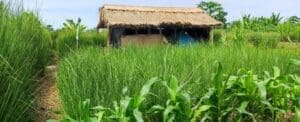
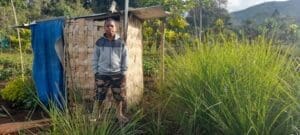
I kindly request a quotation for vetiver grass delivery to Buka Island. Could someone please assist me with my inquiry?
Dick Grimshaw
You should contact Robinson Vanoh : Eagle Vetiver Systems Ltd
Robinson Vanoh
Principal Consultant/DirectorEagle Vetiver Systems Ltd
PO Box 3612
Lae 411
Morobe Province
Papua New GuineaDigicel: (+675) 73641802
Thank you Richard. Truly vetiver systems could play important role in Papua New Guinea. The work we did in south India in rural and tribal villages on vetiver for its essential oil production has given good results. We published our work in ” Sustainable Agriculture Reviews” , Elsevier Pub. I can share my publication. If interested, I can advise or give consultancy for such a project in Papua New Guinea.
E.V.S.Prakasa Rao
[email protected]